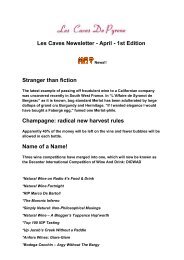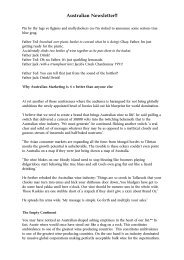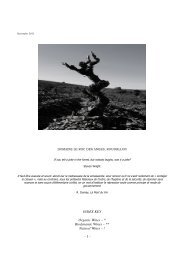Download our list here - Les Caves de Pyrene
Download our list here - Les Caves de Pyrene
Download our list here - Les Caves de Pyrene
Create successful ePaper yourself
Turn your PDF publications into a flip-book with our unique Google optimized e-Paper software.
vine at higher and higher levels of production. Thus we can view cheap bran<strong>de</strong>d wine as no more than alcoholic grape juice,a simulacrum of wine, because it aspires merely to the <strong>de</strong>nominator of price rather than the measure of quality.Why should we call it wine at all? Quality wine is what growers make: it is an art as well as a science; it is also, by<strong>de</strong>finition, inconsistent, because it must obey the laws of fickle Nature. Real wine-making is surroun<strong>de</strong>d by an entire subculture:we speak of the livelihood of small growers, of the lifestyle and philosophy of the people who tend the vinesthroughout the year, of how the vineyards themselves have shaped the landscape over centuries and the way the wines havebecome a living record of their terroir and the growing season. You only have to stand in a vineyard to sense its dynamics.Terroir, as we have said, concerns the farmer’s un<strong>de</strong>rstanding of the land and respect for nature, and a <strong>de</strong>sire to see a naturalcreation naturally expressed.This cannot be said for a commercial product, sprayed with chemicals and pestici<strong>de</strong>s, harvested by the tonne, shipped halfway across the country in huge refrigerated trucks and ma<strong>de</strong> in factories with computerised technology. For factory farmingread factory wine production. The relationship with the soil, the land, the growing season becomes irrelevant – if anythingit’s a hindrance. Flav<strong>our</strong> profiles can be, and are, <strong>de</strong>termined by artificial yeasts, oak chips and corrective acidification. Thelogical extension of this approach would be to use flav<strong>our</strong>ing essences to achieve the style of “wine” you require. Nature isnot only driven out with a pitchfork, but also assailed with the full battery of technology. The fault lies as much at the doorof the supermarkets and high street multiples as with the wine-makers. Volume and stability are <strong>de</strong>man<strong>de</strong>d: stability andvolume are produced. Style prece<strong>de</strong>s substance because t<strong>here</strong> is a feeling that wine has to be ma<strong>de</strong> safe and easy forconsumers.Such confected wines are to real wine what chemical air-fresheners are to wild flowers or as a clipped hedge is to a forest.Paul Draper, of Ridge Vineyards, highlights this dichotomy in what he calls traditional wine-making as opposed toindustrial or process wine-making. (My italics)Whilst it is no bad thing to have technically competent wines, it does promote a culture of what Draper calls ConsumerAcceptance Panels and an acceptance of mediocrity. To adapt Hazlitt’s epigram, rules and mo<strong>de</strong>ls <strong>de</strong>stroy genius. Wines arebeing ma<strong>de</strong> to win the hearts and wallets of supermarket buyers by appealing to a check<strong>list</strong>, a common <strong>de</strong>nominator ofsupposed consumer values. Result? Pleasant, fruity, <strong>de</strong>natured wines bran<strong>de</strong>d to fit into neatly shaved categories: vinireductio ad plonkum. Those guilty of dismissing terroir as romantic whimsy are just as much in awe to the science ofwinemaking by numbers (or voodoo winemaking as I prefer to call it). But w<strong>here</strong> is the diversity, w<strong>here</strong> is the choice?Man cannot live by brand alone…Research shows that bran<strong>de</strong>d wines dominate the market (i.e. the supermarket); these wines must t<strong>here</strong>fore reflect whatpeople enjoy drinking. This is a bogus inference, not to say an exaltation of mediocrity… W<strong>here</strong> is the supposed consumerchoice – when week after week certain influential j<strong>our</strong>na<strong>list</strong>s act as advocates for boring supermarket wines rather thanpointing people in the direction of specia<strong>list</strong> shops and wine merchants? How do we know that consumers wouldn’t preferreal wines (and paying a little more for them)? Those companies who commission surveys to support their brands are notasking the right people the right questions (otherwise they’d get the wrong answers).T<strong>here</strong> will always be bran<strong>de</strong>d wines, and t<strong>here</strong> is a place for them, but the <strong>de</strong>ad hand of globalism <strong>de</strong>termines <strong>our</strong> prevailingculture of conservatism. Mass production ultimately leads to less choice and the eternal quest for a consistency <strong>de</strong>naturesthe product of nature with all its imperfections and angularities. We would like to give customers the opportunity toexperience a diverse array of real wines produced by real people in real vineyards rather than bland wines that could beproduced (and reproduced) in any region or country. T<strong>here</strong> is enough mediocrity, vulgarity and cultural imperialism in <strong>our</strong>lives. It is time to reclaim wine as something individual, pleasurable and occasionally extraordinary.- 10 -








